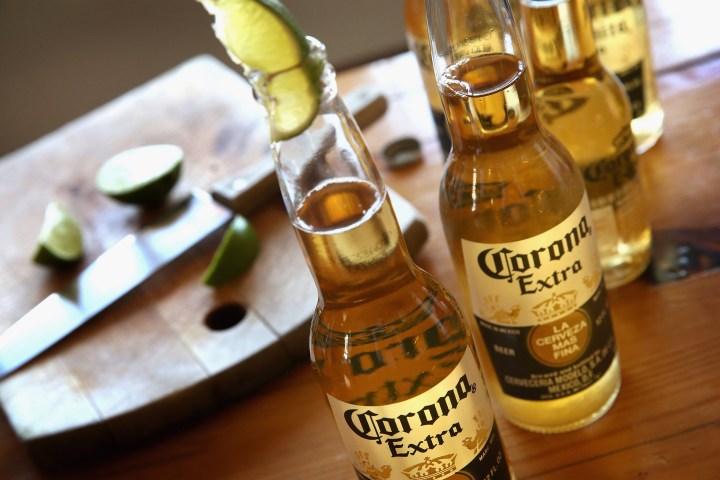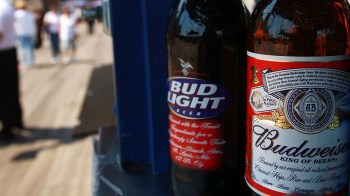
How did the pandemic affect the Corona Beer brand?

This is just one of the stories from our “I’ve Always Wondered” series, where we tackle all of your questions about the world of business, no matter how big or small. Ever wondered if recycling is worth it? Or how store brands stack up against name brands? Check out more from the series here.
Listener Stacey Higdon from Wichita, Kansas, asks:
Before COVID-19 really hit the U.S., I remember seeing lots of light-hearted jokes and memes about the virus and beer. Most memorable was everything in the fridge cowering from a bottle of Corona beer. How has the pandemic affected the company now that the word “corona” brings to mind a virus and not someone lounging by the beach with a beer?
The classic saying that all publicity is good publicity seems to have held true for the Corona beer brand, which weathered a worldwide pandemic despite an unfortunate name similarity with the infectious disease that caused it.
Constellation Brands — which owns the rights to sell Corona in the U.S. — issued a press release at the beginning of the pandemic, refuting claims that the coronavirus had a negative impact on the company. The statement came shortly after the public relations agency 5WPR released a survey that said “38% of beer-drinking Americans would not buy Corona under any circumstances.”
The company said Corona Extra’s dollar sales were up 5% in the U.S. for the four-week period ending in Feb. 16, 2020.
In its latest quarterly report, released in October 2022, Constellation said its beer business had a “depletion growth” of almost 9% over the previous quarter, which was “driven by the continued strength of Modelo Especial and Corona Extra.” In the beer industry, depletion growth is the rate at which the beer leaves distributors to retailers, according to the financial news site Barron’s. Corona Extra alone had a depletion growth of 6%.
A group of researchers from the University of Kentucky, the University of Wisconsin-Madison and Ohio State University actually set out to study how consumers reacted to the beer brand after its name became inadvertently associated with the coronavirus.
Using sales data from the Nielsen Company, the group examined how several beer brands — including Corona, Budweiser, Coors, Miller and Heineken — performed between January 2017 to July 2020.
As COVID-19 cases rose, so did Corona’s sales, according to researchers Yuqing Zheng, Lingxiao Wang, Shuoli Zhao and Wuyang Hu.
Each new positive case led to a $5.30 increase in weekly Corona beer sales compared to these other major beer brands.
The team pointed to several possible causes for this phenomenon, including brand loyalty for a company that’s “a top imported beer brand in the United States” and the additional “brand exposure and promotion” that resulted from increased attention on social media.
Dawn Lerman, a marketing professor and the executive director of the Center for Positive Marketing at Fordham University, also says that the accidental publicity could have helped Corona’s sales.
“If you’re looking for beer, what beer might come to mind first, or what pops out to you on the shelf in the store? It’s the one that shares a name with the topic that you’re hearing most about,” Lerman said.
The Corona beer buzz
Morning Consult Brand Intelligence, which tracks the public perception of thousands of brands, can give us an idea of what consumers 21 years and older thought of the Corona beer brand during the pandemic.
The “buzz” around the brand, or the percentage of people who had seen, heard or read something about Corona, climbed from 28% in February 2020 to 33% in March–May 2020, according to MCBI’s data.
The “favorability” of Corona beer, or how well the brand is liked, did dip from 44% in February 2020 to 41% in March, said Emily Moquin, food and beverage analyst at Morning Consult.
But Moquin pointed out ““it was not a major, drop-off-a-cliff kind of a decline.”
She added that favorability levels recovered quickly after May 2020, reaching pre-pandemic levels.
“The word ‘COVID’ or ‘coronavirus’ became a part of our vernacular — for better or worse,” Moquin said.
Because we became so used to the term “coronavirus” consumers probably stopped noticing the word “corona,” she explained.
Moquin said Morning Consult also asked consumers if people intended to purchase Corona products in the future, finding that those levels remained relatively consistent throughout the beginning months of the pandemic, and even throughout 2021 and 2022.
Corona is an established brand, so hypothetically, Lerman said if a newer company emerged during the pandemic with a product that had that name, there could have been a negative reaction. She pointed out that people might have suspected that the company chose that name on purpose because it was part of our daily speech, although she said she could see it going either way, with the brand becoming successful because of the publicity.
A thriving alcohol industry
With people forced to stay indoors because of stay-at-home orders, some adults said they started drinking alcoholic beverages more often, according to a 2020 Morning Consult poll. Between February 2020 and February 2021, off-premise sales of spirits rose 29%; wine by 21%; and beer, flavored malt beverages and cider by 16%, according to data provided by Nielsen Answers.
Alcohol sales in general increased and associating Corona with the pandemic in a “humorous manner” may have “helped relieve some of the stress around the pandemic,” noted Ann Kronrod, a marketing, entrepreneurship and innovation professor at the University of Massachusetts Lowell.
In their paper “Ad wearout wearout” Kronrod and co-author Joel Huber found that while more frequent advertising of a brand may lead to greater annoyance, that annoyance is likely to decay quickly over time. Memory, on the other hand, doesn’t decline as quickly as a negative emotion.
“This means that frequent mention of your brand name, even in association to a disease, will result in better memory for your brand while the negative association will quickly decay and only the brand memory will linger,” Kronrod said.
As for whether consumers think of the virus or the beer when they see or hear the word “corona” now, Lerman said the way we process information is context-dependent.
So because she was talking about the coronavirus with her colleagues recently and reading articles about it, the virus would probably come to mind if you asked her now.
But because people associate beer with gatherings and holidays, her response would be different if she were planning a party and thinking about what to serve. “Then beer will be more top of mind than the virus,” she said.
There’s a lot happening in the world. Through it all, Marketplace is here for you.
You rely on Marketplace to break down the world’s events and tell you how it affects you in a fact-based, approachable way. We rely on your financial support to keep making that possible.
Your donation today powers the independent journalism that you rely on. For just $5/month, you can help sustain Marketplace so we can keep reporting on the things that matter to you.


















